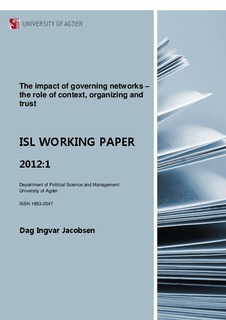The impact of governing networks - the role of context, organizing and trust
Working paper
Permanent lenke
http://hdl.handle.net/11250/134914Utgivelsesdato
2012Metadata
Vis full innførselSamlinger
- ISL Working Papers [29]
Sammendrag
While our knowledge on the form and functioning of governing networks steadily increases, there are still holes in our knowledge of the impact of these networks. Using a multidimensional approach to measuring impacts, this article reports the perceived effects of the so-called regional councils in Norway. Impact is measured along four dimensions: impact on service provision, capacity to solve border-crossing problems, capacity to influence external actors and ability to develop collaborative relations in the network. As shown by earlier studies, trust between participants in the network play a crucial role in creating impact. In addition, consensus in the networks seems to be an equally important predictor of impact. Also, contextual elements like network size, economic asymmetry and interdependence, as well as organizational elements like administrative capacity and network age, have several direct effects on the perceived impacts, although not always in the predicted direction. Consequences for the role of managing networks are discussed, as well as the limits of the networks themselves.
Beskrivelse
Presentation on department page: http://www.uia.no/no/portaler/om_universitetet/oekonomi_og_samfunnsvitenskap/statsvitenskap_og_ledelsesfag/ forskning_isl/isl_working_papers_series
